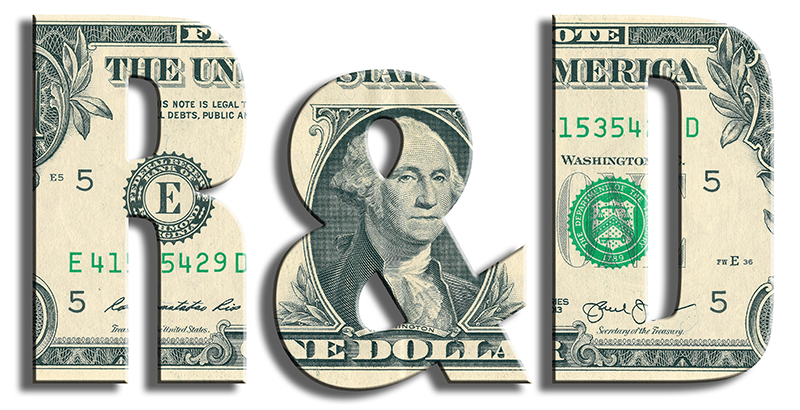
The R&D World Index (RDWI) for the week ending February 11, 2022, closed at 5,188.11 for the 25 companies in the RDWI. The Index was down -4.28% (or 231.98 basis points) from the week ending February 4, 2022. The stock of eight RDWI members gained value from 0.02% (Alibaba) to 5.34% (Daimler AG). The stock of 17 RDWI members lost value from -0.35% (Volkswagen AG) to -7.40% (Facebook).
The U.S. Department of Labor released data last week on the consumer price index (CPI) for January 2022 which showed that the CPI accelerated to a 7.5% annual rate, surpassing the 7.0% rate seen in December and above the 1.8% rate seen in 2019 before the coronavirus pandemic. The core price index, which excludes food and energy, rose to 6% in January from a year earlier and again eclipsing December’s 5.5% rate. These rates are the highest seen since February1982. Specifically, food prices rose 7% in January while energy prices rose 27%. Annual wage growth also rose to 5.1% in January, the highest rate since 1984. The steadily rising CPI for the past three months, well above the Federal Reserve’s 2.0% target, lead economists to expect the Fed to raise short-term interest rates at their next meeting in March. Interviews with Fed members reveal that they actually expect the March rates to go up by a half point (0.5%), rather than the traditional quarter-point raises seen in the past. Another half-point gain is also likely to be seen in the Fed’s May FOMC (Federal Open Market Committee) meeting as well, followed by quarter-point increases in following months. If CPI increases continue, the Fed theoretically could raise rates between scheduled policy meetings (in March, May and June) as well. These interest rate increases could affect R&D in that corporations’ cost to borrow money for R&D investments will increase.
Economists in the United Kingdom (U.K.) are also predicting an economic slowdown in 2022 from their strong 7.5% growth in 2021. U.K. economic output fell 0.2% in December, according to the U.K.’s Office for National Statistics. Despite growth in October and November, total GDP (gross domestic product) for the fourth quarter was still 0.4% below its final three months of 2019, before the pandemic. The Bank of England (BOE) is forecasting a 7.0% inflation rate for the U.K. in the coming months but is hesitant to impose inflation-restricting interest rate increases which might limit economic growth. The BOE has already stated it will levy two more interest rate increases in 2021. The International Monetary Fund (IMF) expects the U.K. economy to grow by 4.7% in 2022.
The Director of the White House Office of Science and Technology Policy (OSTP), Dr. Eric Lander, resigned last week following criticism of his alleged treatment of subordinates. Lander was also President Biden’s cabinet-level top science advisor. Lander was R&D Magazine’s 2003 Scientist of the Year when he was founding director of the MIT/Harvard-associated Broad Institute in Cambridge, Massachusetts.
The European Commission (EC), the European Union’s (EU’s) executive arm introduced a plan (the European Chips Act) last week that would make available $49 billion in public and private funds for the semiconductor chip-making industry. The proposal would give the EC power to demand companies to give priority to specific products where there is a shortage. While the EU is an important supplier of the materials and equipment needed to manufacture semiconductors, it is well behind Asia and the U.S. in the fabrication of most types of semiconductor devices. RDW Index member Intel, Santa Clara, California, and ASML Holdings, Veldhoven, the Netherlands, both said they supported the EU’s plan. Intel invests more than $14.5 billion in R&D while ASML invests nearly $3 billion.
RDW Index member Eli Lilly & Co., Indianapolis, was authorized last week by the U.S. Food and Drug Administration (FDA) to offer their new COVID-19 monoclonal antibody drug, bebtelovimab, for the treatment of mild to moderate infections in non-hospitalized patients 12 and older who are at high risk of getting severely sick. The drug is intended for people who cannot get access to alternative COVID-19 treatments. The Biden administration agreed last week to purchase 600,000 treatment courses of the new Lilly antibody drug. Lilly previously sold bamlaniviman and etesevimab drugs for COVID-19 treatment, but they were restricted in January by the FDA when the FDA found they lost potency against the COVID-19 Omicron variant.
The FDA last week expressed concerns about the quality of cancer drug research studies conducted in China. The question proposed concerned the applicability of the potential drugs to American patients. The potential delay in these product approvals could lead to outright rejections, according to drug-industry executives. The action affects plans by Eli Lilly & Co. and Novartis AG who were planning on bringing Chinese medicines to the U.S.
French President Emmanuel Macron last week announced plans to build six new nuclear reactors. As part of the plans, France’s Electricite de France (EDF) SA, the country’s state-controlled power company reached a deal to buy part of the nuclear steam turbine business of General Electric Co., including several of the GE factories in France. Current EDF nuclear projects in France, Finland and the U.K. are years behind schedule and billions of dollars over budget. Much of these issues came about following Japan’s Fukushima nuclear disaster and the cancellation of new nuclear generation projects. The Fukushima event resulted in the loss of nuclear construction expertise and an overall weakening of the industry.
Researchers at the Joint European Torus (JET), Oxfordshire, U.K., last week announced that a nuclear fusion energy research project produced the highest sustained nuclear fusion ever recorded. The results of the experiment in December generated 59 Mjoules of fusion energy for five seconds. JET’s tokamak reactor is the only device that can combine a mix of deuterium and tritium hydrogen fuels.
RDW Index member Pfizer, New York City, announced last week that sales of its COVID-19 vaccine and other products should boost its 2022 revenue to about $100 billion. With this cash flow, Pfizer has done several acquisitions and partnerships to bolster its drug pipeline. The company has invested $25 billion in new business development in the past three years. It forecasts new deals will generate an additional $25 billion in revenue by 2030.
Eight RDW Index members (Apple, Microsoft, Pfizer, Alphabet/Google, Johnson & Johnson, Toyota Motor, Merck & Co. and IBM) were listed in Fortune Magazine’s February/March 2022 issue as members in their Top 50 Most Admired All-Stars. Apple, Microsoft, J&J and Toyota have been on Fortune’s list every year since 1998.
R&D World’s R&D Index is a weekly stock market summary of the top international companies involved in R&D. The top 25 industrial R&D spenders in 2019 were selected based on the latest listings from Schonfeld & Associates’ June 2020 R&D Ratios & Budgets. These 25 companies include pharmaceutical (10 companies), automotive (6 companies) and ICT (9 companies) who invested a cumulative total of nearly 260 billion dollars in R&D in 2019, or approximately 10% of all the R&D spent in the world by government, industries and academia combined, according to R&D World’s 2021 Global R&D Funding Forecast. The stock prices used in the R&D World Index are tabulated from NASDAQ, NYSE and OTC common stock prices for the companies selected at the close of stock trading business on the Friday preceding the online publication of the R&D World Index.



Tell Us What You Think!